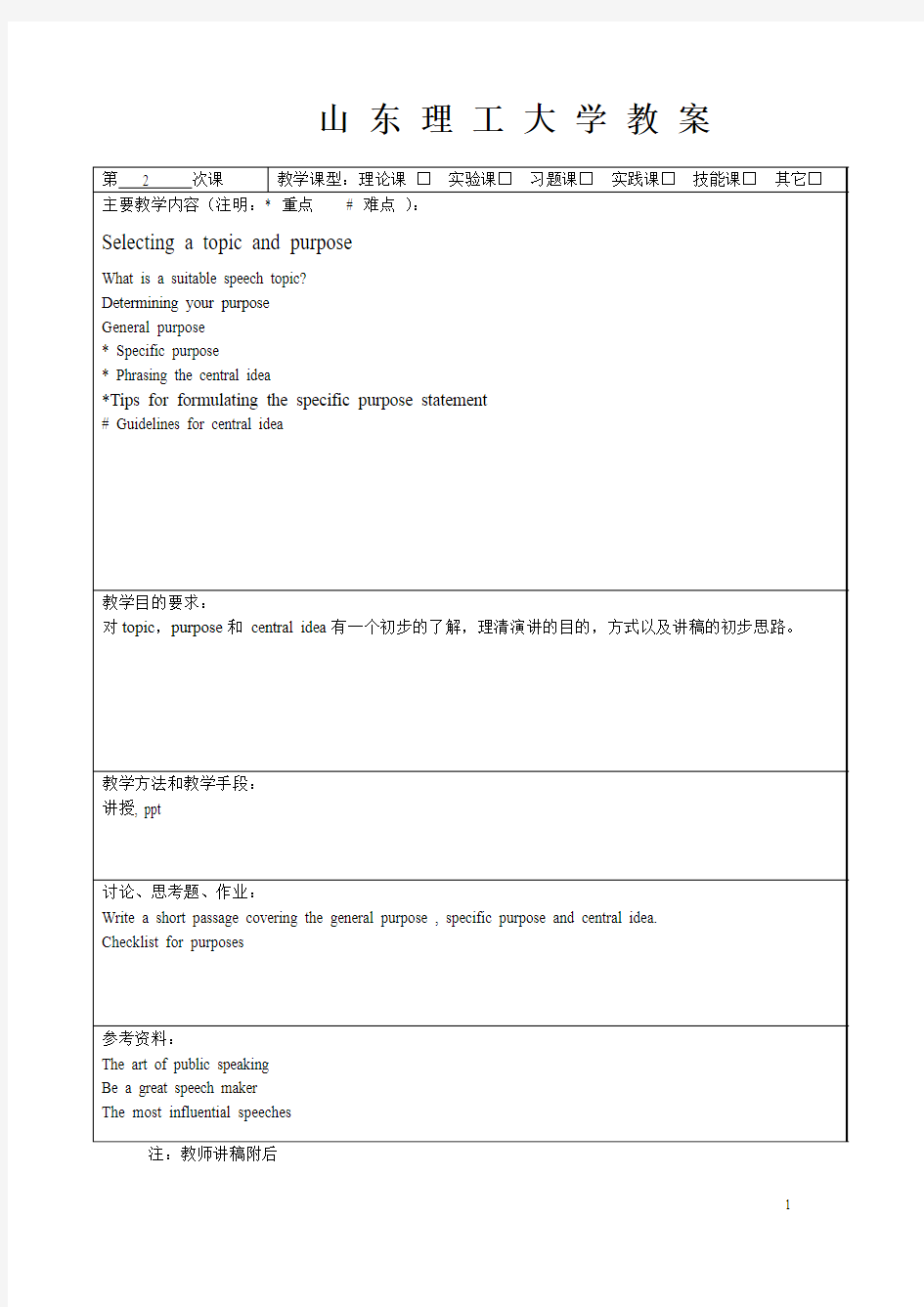英语演讲选修课教案2 selecting a topic

- 1、下载文档前请自行甄别文档内容的完整性,平台不提供额外的编辑、内容补充、找答案等附加服务。
- 2、"仅部分预览"的文档,不可在线预览部分如存在完整性等问题,可反馈申请退款(可完整预览的文档不适用该条件!)。
- 3、如文档侵犯您的权益,请联系客服反馈,我们会尽快为您处理(人工客服工作时间:9:00-18:30)。
山东理工大学教案
注:教师讲稿附后
Lesson two Selecting a topic and purpose
I am lucky, honored and humbled to stand here, so many students watch how I would perform on this small but terrifying platform. Frankly speaking, I am quite nervous standing here, especially before you, a large group of audience, no one is perfect, it is not shameful at all to admit my nervousness, because everybody will be nervous to some extent when asked to speak before a big audience. Why did I say so, I have proof.
One of the major concerns of students in any speech class is stage fright. We may as well face the issue squarely. Many people who converse easily in all kinds of everyday situations become frightened ar the idea of standing up before a group to make a speech. If you are worried about stage fright, you may feel better knowing that you are not alone. A survey conducted in 1973 asked more than 2,500 Americans to list their greatest fears. To the surprises of the reserchers, the largest number fo people----41%----listed speaking before a group among their greatest fears. Amazing as it may seem, many Americans appear to consider public speaking a fate worse than death.
This is A survey conducted in America
Researchers asked their respondents to list their greatest fears, here is how they responded:
Greatest Fears Percent Naming
A party with strangers 74
Giving a speech 70
Asked personal questions in public 65 Meeting a date’s parents 59
First day on a new job 59
Victim of a practical joke 56 Talking with sb. in authority 53
Job interview 46 Formal dinner party 44
Blind date 42 From the chart, we can see that speechmaking ranks near the top in provoking anxiety.
Therefore, we can say that speaking in public means a great challenge to everybody. Nervousness mainly comes from the fact that we do not know what to say, how to say and less training. There are a lot of things that make a successful speech, such as your topic, your delivery, your language. Among them, the organization of the speech is the first concern of the public speaker. Then comes the second problem, How to organize you speech well. It involves several factors, such as your topic, your purpose and your central idea, and so on. They are what we are going to discuss today. Today we mainly focus on the following matters:
Choosing a topic
Determining your purpose
The central idea
Let‟s begin with selecting a topic:
Selecting a topic
The first step in speech making is choosing a topic. It is a key element of a successful speech.. For speeches outside the classroom this is seldom a problem. Usually the speech topic is determined by the occasion, the audience, and the speaker‟s qualifications. When George W. Bush lectures on a college campus, he is invited to speak about foreign policy and current events. The same is true of ordinary citizens. The doctor is asked to inform how to deal with sport injuries, the florist discusses how to grow better houseplants, Mr. Fan Yuejin is asked to talk about school management. And Certainly I will never be expected to tell you something about mathematics.
In a public speaking class the situation is different. Most of your speech assignment will not come with a designated topic. You generally have great leeway in selecting subjects for your speeches. This would appear to be an advantage, since it allows you to talk about matters of personal interest. Yet how to choose a proper topic remains a difficulty.
What is a suitable speech topic
First your topic should be Worthwhil e: worthwhile topics must address issues that have significant implications for the audience. The topic must be important enough to merit the time and attention of a group of intelligent and educated persons.
Second, it should be Appropriate: the best way to ensure that your topic is appropriate is to select a topic about which you know a lot and would like to learn more. It is a lot easier to please an audience when the topic interests them. The topic should also be appropriate for the occasion. Time limitations will exclude certain topics because they are too complex.
Finally, your topic should be Limited in scope
The major problem for beginning speakers is that they attempt to cover a huge topic in too short a time; the inevitable result is that nothing specific is covered – everything is touched on but only superficially. You have to narrow and limit your topic, and divide the topic into several significant parts.
Determining your purpose
The purpose of your speech is your goal; it is what you hope to achieve during your speech. Generally speaking we have two types of purpose: general purpose and specific one.
General purposes(the broad goal of a speech)
The general purpose is he broad goal of a speech, usually it falls into one of two overlapping categories---to inform or to persuade.
When your general purpose is to inform, you act as a teacher or lecturer. Your goal is to convey information ---and do it clearly, accurately and interestingly, your aim is to enhance the knowledge and understanding of your listeners---to give them information they did not have before.
When your general purpose is to persuade, you act as an advocate or a partisan. Your goal is to change or structure the attitudes or actions of your audience. The difference between informing and persuading is the difference between explaining and exhorting. Your aim is to win over your
